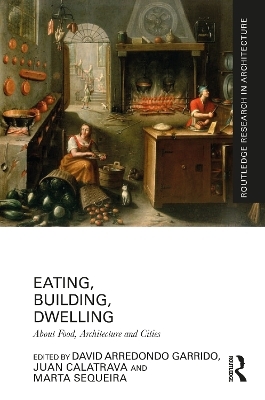
Eating, Building, Dwelling
Routledge (Verlag)
978-1-032-79828-8 (ISBN)
- Noch nicht erschienen (ca. November 2024)
- Versandkostenfrei innerhalb Deutschlands
- Auch auf Rechnung
- Verfügbarkeit in der Filiale vor Ort prüfen
- Artikel merken
The intricate relationship between food, city and architecture, spanning from ancient civilizations to the present, serves as a focal point for interdisciplinary discourse. This book delves into a diverse set of cases throughout history in which processes related to food significantly influenced architectural or urban designs.
This book delineates three spatial levels — city, home and intermediate spaces — illuminating their dynamic interplay within the construct of a continually evolving “food space." Featuring 12 contributions from Mediterranean Europe, this publication explores historical legacies and contemporary challenges. Divided into urban-territorial and architectural scales, it offers nuanced insights into urban dynamics, domestic life and gastronomic tourism. Supported by a prestigious introductory study, this research advances a comprehensive understanding of food's role in shaping urban environments.
Through the chapters of this book, those interested in cultural studies of food, urban history and architecture will be able to reflect on our relationship with food and its processes, and how it affects the way we live and design our cities and their architectures.
David Arredondo Garrido has a doctorate in architecture and master’s in architecture and historical heritage from the Universidad de Sevilla. He is Associate Professor in History and Theory of Architecture at the Universidad de Granada and visiting researcher at the Technische Universität Berlin, Universidade de Évora, Universität fur Angewandte Kunst in Vienna, Università degli Studi in Florence, Universitá Roma Tre, and former professor at the Universidad de Málaga. Arredondo Garrido is Chief editor of the academic journal SOBRE, Prácticas Editoriales en Arte y Arquitectura and coordinator of the Conferences Cultura y Ciudad. He has been awarded with the Research Award in the BEAU 2020, for his studies on the landscape architect Leberecht Migge. He is the principal investigator of the Research Project "Food and the City" funded by the Government of Spain and the European Union. Juan Calatrava is a Full Professor in Architectural History at the ETS Arquitectura of the Universidad de Granada. He has an honorary degree by the Universidad de Alcalá. He is the author of more than 200 publications about the history and theory of contemporary architecture (specially Le Corbusier) and about the relationships between architecture, painting, and literature. He was the curator of exhibitions in Madrid, Granada, Buenos Aires, Paris and Munich. He is a member of the scientific committees of 23 academic journals in various countries, member of the Board of Administration of the Fondation Le Corbusier (Paris) and in 2021 holder of the Chair of the Prado Museum. He is President of the Asociación de Historiadores de la Arquitectura y el Urbanismo (AhAU). Marta Sequeira is an architect at the Universidade Técnica de Lisboa and received her doctorate from Escola Tècnica Superior d’Arquitectura de Barcelona. She is currently a professor at the Universidade Autónoma de Lisboa and at the ISCTE-Instituto Universitário de Lisboa. She is a guest lecturer at the architecture schools of Barcelona, Granada, Valencia, Girona and Monterrey. She has curated several architecture exhibitions, such as Carrilho da Graça: Lisboa, Flashback/Carrilho da Graça, or Habitar Lisboa, among others. She received the Prix de la Recherche Patiente – awarded annually by Fondation Le Corbusier (Paris) – with the research presented in Towards a Public Space, published by Routledge.
Part 1 Cities and Territories 1. Swallowing as a Metaphor for the Metropolis: Food and Its Spaces in Émile Zola’s Paris 2. Housing, Spanish National Catholicism and the Agrarian Utopia (1936–1959) 3. The Big Lettuce: Mapping the Historical Foodscape of Lisbon 4. Food as Territory: Gathering, Production and Distribution of Food in the Typo-Morphological Research of Saverio Muratori 5. The Lisbon Territory from an Agricultural Perspective: A Topographic Reading Over the Centuries 6. Bioregional Food Systems and the Structures of Long-Term Territorialization Processes Part 2 Architecture and Domestic Space 7. The Kitchen: A World Suspended between Past and Future 8. Motu Et Lumine: Technologies of Fire in the Renaissance Kitchen 9. Digesting Design: Le Corbusier’s Immeuble-Villas Food Strategy 10. The Modern Kitchen as a Social, Economic and Technological Tool: The Efficient Kitchen, the Integrated Kitchen and the Disappearing Kitchen 11. "Each House Will Have a Kitchen Garden Attached": Dwelling, Landscape Construction and Food Processes in the First Periphery of Granada (1900–1955) 12. Collective Architecture in the Early Second Half of the 20th Century and New Ways of Food Consumption
| Erscheint lt. Verlag | 26.11.2024 |
|---|---|
| Reihe/Serie | Routledge Research in Architecture |
| Zusatzinfo | 33 Line drawings, black and white; 30 Halftones, black and white; 63 Illustrations, black and white |
| Verlagsort | London |
| Sprache | englisch |
| Maße | 156 x 234 mm |
| Gewicht | 590 g |
| Themenwelt | Sozialwissenschaften ► Soziologie ► Spezielle Soziologien |
| Technik ► Architektur | |
| Weitere Fachgebiete ► Land- / Forstwirtschaft / Fischerei | |
| ISBN-10 | 1-032-79828-9 / 1032798289 |
| ISBN-13 | 978-1-032-79828-8 / 9781032798288 |
| Zustand | Neuware |
| Haben Sie eine Frage zum Produkt? |
aus dem Bereich


